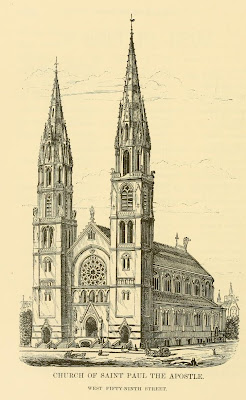There is hardly any one, my brethren, who lives where this feast of Christmas is kept who does not feel a special joy in it. Why do we say that “Christmas comes but once a year,” if not because we feel that nothing else can take its place? We look forward to it months beforehand; when it comes, we keep it as long as we can and let it go with regret. Why is it that it has such a warm place in our hearts?
Is it merely that it is by common consent a great holiday; that it is a breathing-place in the bustle and hurry of life, a time for meeting our friends, for giving and receiving tokens of regard, a time of feasting and making merry? This has something to do with it, but it is not all. For if this were all it would be impossible to make by law a holiday like this, which no one has ever succeeded in doing. The early settlers of our country, in a mistaken zeal against church festivals, endeavored to make a substitute for Christmas; but the failure of their attempt has driven their descendants back to the observance of this feast, though not to the church which gives it to them.
Yes, we all feel that the joy of Christmas is a thing not made to order. It comes from a source which lies in the very mystery which we commemorate; and, even though we do not meditate or reflect on it, the stream from this source diffuses itself through our life and sweetens all the other joys which come at this time. And they come because of it; we make merry outwardly because we are, and have cause to be, glad at heart.
And what is this cause and source of joy? Is it because Christ our Lord has come to save us from sin and eternal ruin? No, it is not simply that; for we celebrate our salvation, our redemption, our ransom from the power of death and hell more specially at Easter than now. That is the festival of our Lord’s triumph and our deliverance; it should and does open heaven to our souls, and give them a promise and almost a foretaste of it. But still it does not come home to our hearts as this faithful time of Christmas does.
And no wonder; for at Easter we cannot but feel that our Lord, though triumphant and glorious, and promising us a share in his triumph and glory, still is separated from us. He has passed the portals of death, he has risen from the grave, he has put on immortality. We cannot follow him where he has gone till we have freed ourselves from all the stains of earth, till we have been purified and washed penance in his Precious Blood. He has passed from mortal to immortal life, and it is the raising of the mortal to the immortal, of earth to heaven, that Easter celebrates. And this, though indeed it is the object of all our hope, it is so high that we, sinners that we are, cannot fully make it our present joy.
But Christmas is heaven come down to earth. It is the God of heaven condescending to us; taking our weakness upon him, sympathizing with us, and asking us for sympathy and love. He hides his majesty and glory; he veils the splendor of his face; he puts aside all that could distinguish him from ourselves. He invites us to come to him without fear; he asks only that, sinful though we be, we should try to love him as he loves us. Christmas is the sight of the Creator begging for the love of his creatures, and humbling himself that he may obtain it; that is the reason why it goes to the heart of all who have any heart to give.
Let us, then, in this happy season, enter into this joy which is the cause of all the rest which we have, which is so easy for us, which has come to our doors, and only asks that it should be let in. But let the love which goes with it be not a mere passing feeling, to bear no fruit in our lives. Let it bring us indeed to him who has come down to us; let our joy be crowned and perfected by a real return of our hearts to him who has done so much to win them; let us receive him in his holy sacraments, and never let him go again.
Five-Minute Sermons for Low Masses on All Sundays of the Year, by Priests of the Congregation of St. Paul, Volume II (New York: The Catholic Publication Society, 1886), pp. 50-52.












